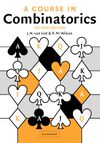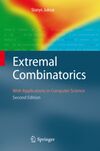组合数学 (Spring 2013)
This is the page for the class Combinatorics for the Spring 2013 semester. Students who take this class should check this page periodically for content updates and new announcements.
Announcement
- The second homework assignment is out, due in ONE week.
- 由于清明假期,作业提交时间推迟一周(4月11日课上交)。
- The first homework assignment is out, due in two weeks.
Course info
- Instructor : 尹一通
- email: yitong.yin@gmail.com, yinyt@nju.edu.cn,
- office: 804
- Teaching fellow: 金宇
- email: jinyu1122@hotmail.com
- Class meeting: Thursday 8am-10am, 仙 I-103.
- Office hour: Wednesday 2-4pm, 计算机系 804.
Syllabus
先修课程 Prerequisites
- 离散数学(Discrete Mathematics)
- 线性代数(Linear Algebra)
- 概率论(Probability Theory)
Course materials
成绩 Grades
- 课程成绩:本课程将会有六次作业和一次期末考试。最终成绩将由平时作业成绩和期末考试成绩综合得出。
- 迟交:如果有特殊的理由,无法按时完成作业,请提前联系授课老师,给出正当理由。否则迟交的作业将不被接受。
学术诚信 Academic Integrity
学术诚信是所有从事学术活动的学生和学者最基本的职业道德底线,本课程将不遗余力的维护学术诚信规范,违反这一底线的行为将不会被容忍。
作业完成的原则:署你名字的工作必须由你完成。允许讨论,但作业必须独立完成,并在作业中列出所有参与讨论的人。不允许其他任何形式的合作——尤其是与已经完成作业的同学“讨论”。
本课程将对剽窃行为采取零容忍的态度。在完成作业过程中,对他人工作(出版物、互联网资料、其他人的作业等)直接的文本抄袭和对关键思想、关键元素的抄袭,按照 ACM Policy on Plagiarism的解释,都将视为剽窃。剽窃者成绩将被取消。如果发现互相抄袭行为, 抄袭和被抄袭双方的成绩都将被取消。因此请主动防止自己的作业被他人抄袭。
学术诚信影响学生个人的品行,也关乎整个教育系统的正常运转。为了一点分数而做出学术不端的行为,不仅使自己沦为一个欺骗者,也使他人的诚实努力失去意义。让我们一起努力维护一个诚信的环境。
Assignments
- Problem Set 1, due on April 4, Thursday, in class.
- Problem Set 2, due on April 25, Thursday, in class.
Lecture Notes
- Basic enumeration | slides1 | slides2
- Generating functions | slides1 | slides2
- Sieve methods | slides1 | slides2
- Cayley's formula | slides
- Pólya's theory of counting | slides1 | slides2
- Existence problems | slides1
- The probabilistic method
- Extremal graph theory
- Extremal set theory
- Ramsey theory
- Matching theory
- Flow and matching
Concepts
- Binomial coefficient
- Composition of a number
- Combinations with repetition, [math]\displaystyle{ k }[/math]-multisets on a set
- Stirling number of the second kind
- Partition of a number
- Ferrers diagram (and the MathWorld link)
- The twelvefold way
- Generating function and formal power series
- Fibonacci number
- Newton's formula
- Catalan number
- The principle of inclusion-exclusion (and more generally the sieve method)
- Möbius inversion formula
- Derangement, and Problème des ménages
- Ryser's formula
- Euler totient function
- Cayley's formula
- Double counting and the handshaking lemma

